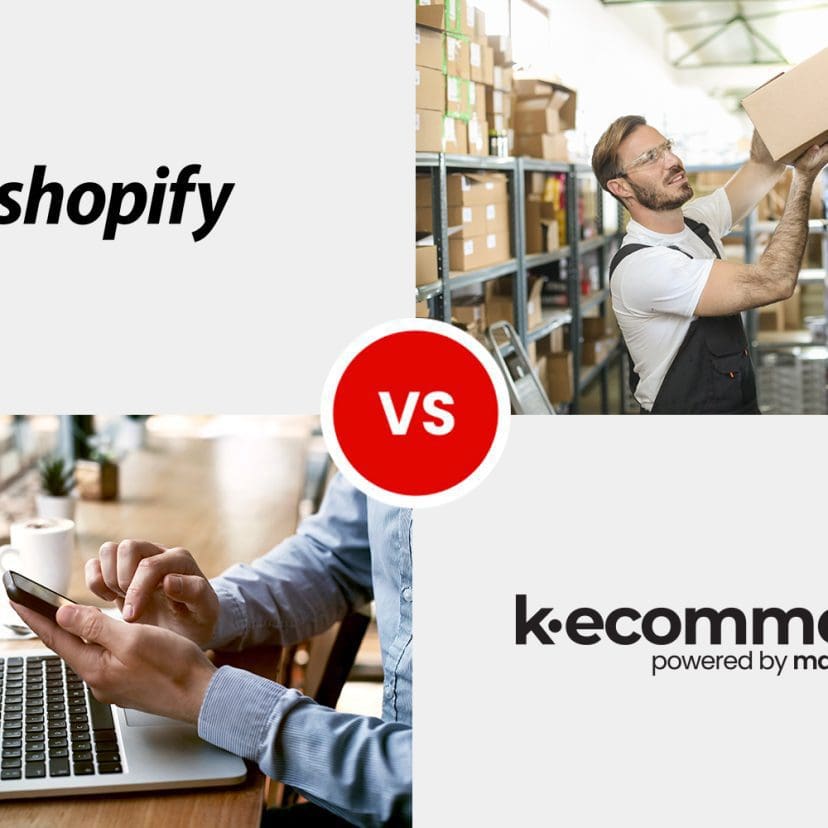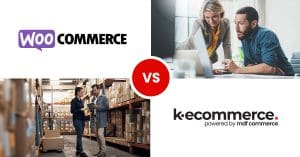
Shopify vs. k-ecommerce: Which Ecommerce Platform Is Best?

Marketing Team
k-ecommerce
The B2B ecommerce market is rapidly growing. B2B ecommerce sales in the U.S. are expected to grow by 11.8% and reach $1.98 trillion in 2023.
But to profit from this lucrative market, you must select the best solution for your ecommerce business. You need an ecommerce platform that’s user-friendly, streamlined, efficient, and scalable.
Two popular ecommerce platforms are Shopify and k-ecommerce.
Shopify offers a basic product catalog functionality and shopping cart designed for B2C, which you can customize with third-party plugins and a la carte modules.
In contrast, k-ecommerce is an all-inclusive ecommerce platform for B2B and D2C, with native integration to Acumatica, SAP Business One, and Microsoft Dynamics.
In this guide, we’ll compare Shopify vs. k-ecommerce in terms of technology, B2B functionality, and partnership, so you can decide which commerce platform is best for your business.
Here’s what you’ll learn:
1. Technology (Ecommerce ERP Integration & Foundation)
An ERP platform unites your various operational and administrative processes — such as inventory, accounting, and customer relationship management (CRM) — into a centralized, cloud-based ecommerce platform.
When you link your online store to your ERP, you can streamline the order management process and automate many tasks. That helps you eliminate errors, save time, and grow your business.
With that in mind, let’s make an ecommerce platform comparison between Shopify and k-ecommerce regarding ERP integration.
Shopify
You can only connect your ERP to the Shopify store using third-party connectors at a high additional cost. Without the connectors, you’ll have to manage your business data and enter orders on different systems. It also means you will need to interact with a third-party company for any necessary customer service.
Shopify also uses Liquid, a proprietary programming language created exclusively for its software solution. This significantly reduces the number of developers who can use it.
k-ecommerce
On the other hand, k-ecommerce has native integration with Acumatica, SAP Business One, and Microsoft Dynamics suite. As a result, k-ecommerce can share data with your ERP in real time and automate critical business processes such as inventory management and order entry.
Using Microsoft.NET, a standard technology, also makes the platform more accessible to developers. On top of that, the platform has Sync Technology to synchronize data from your ERP’s back-end system to your k-ecommerce platform and vice versa. You also have only one contact for everything.
2. B2B Functionality
B2B companies typically have unique requirements. Their sales functions are so different from B2C that they need unique ERP ecommerce solutions to optimize their operations.
Let’s look at how Shopify and k-ecommerce serve the B2B industry.
Shopify
Shopify is geared toward the B2C ecommerce market. Implementing B2B ecommerce features like customer-specific rules and customized pricing requires third-party plugins.
If you encounter any problems, you must contact several vendors directly and troubleshoot multiple systems and processes. That can consume valuable time you could spend on other business tasks.
Purchasing Shopify Plus adds some B2B functionality. But the downside of this option is that the ERP connectors for Shopify Plus are pretty expensive, costing thousands of dollars per year in transaction fees. In some cases, ERP connectivity can be more costly than the ecommerce software itself.
k-ecommerce
Designed for B2B, k-ecommerce differs significantly from Shopify in how it caters to the needs of those types of businesses. Simply put, k-ecommerce is an ecommerce platform for B2B.
The k-ecommerce platform provides advanced B2B functionality as well as B2C functionality. For example, it provides features such as custom pricing, multi-channel marketing, and data security that’s built-in directly to the k-ecommerce platform to accommodate special B2B needs.
3. Partnership
When it comes to offering their services, Shopify and k-ecommerce handle their clients quite differently. Shopify is a service provider offering solutions to its customers while prioritizing its goals.
In contrast, k-ecommerce is a service partner that offers solutions to clients but prioritizes the client’s needs and goals.
Shopify
Shopify struggles in this category because it’s a software provider rather than an implementor. It relies on third-party firms and organizations to implement their platforms on Shopify.
That’s why many Shopify customers are unhappy due to a lack of good customer service. The number of Shopify stores that leave the ecommerce solution or close down altogether is growing at 34% per year.
Since Shopify has a low starting cost, businesses and startups try their idea on the platform and realize it’s not good, so they stop using it.
Besides that, Shopify announced it’s raising the prices for all of its subscription plans on April 23, 2023.
With these new changes, customers will see an average of 33% increase in their monthly subscription plans. Such a price increase is a big jump for small business owners, who have already been hit pretty hard over the past few years.
k-ecommerce
As a service partner, k-ecommerce provides its services while focusing on helping businesses grow and achieve their goals. We’re both an implementor and service provider.
The k-ecommerce team first learns everything about your company, then implements configurations that can be turned on and off depending on your needs. That’s why k-ecommerce offers personalized and complex pricing (per customer and customer group) since every business has unique goals and needs.
Our in-house development team also provides unlimited custom development and maintenance of your ecommerce platform. The team provides all-in-one, in-house support by email, phone, and live chat to help you resolve any issues quickly.
Final Thoughts: Shopify vs. k-ecommerce | Which Ecommerce Platform Is Best?
When looking at Shopify vs. k-ecommerce, k-ecommerce clearly emerges as a more robust ecommerce software solution for B2B companies by providing better technology, functionality, customer service, and ERP integration with ecommerce websites.
That said, Shopify can be a good solution if you want to build a small B2C ecommerce store.
However, k-ecommerce is the best option if you want a robust solution for a B2B store that can scale with your small business as it grows.
Interested in starting an ecommerce platform that helps you grow? Contact us today to learn how k-ecommerce can offer you an integrated omnichannel solution to help you launch or scale your B2B ecommerce store.






